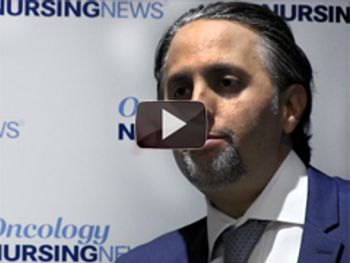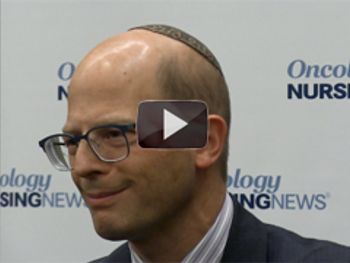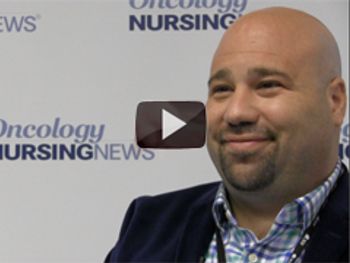
Jeannine Brant discusses the important things to remember when assessing pain in a patient with cancer.

Jeannine Brant discusses the important things to remember when assessing pain in a patient with cancer.

Karen Lee, NP, explains the importance of keeping patients with cancer hopeful but realistic when starting immunotherapies.

Omid Hamid, MD, compares the responses of patients with melanoma on single-agent immunotherapy treatment to those on combination therapy treatments.

Adam Dicker explains the benefit of nurses when communicating with patients, and how they help to combat "white coat syndrome."

Beth Sandy, CRNP, discusses the challenges that can arise when managing a patient's chemotherapy-induced nausea.

Brianna Hoffner, MSN, NP, RN, discusses complex immune-related adverse events and how nurses can go about treating patients.

Dr. Puneeth Iyengar expresses the importance of nutrition and hydration for patients with stage III lung cancer.

Dr. Erin Hofstatter gives some "red flags" that indicate a patient or family member should consider genetic counseling and testing.

Dr. Jonathan Schoenfeld discusses the need for collaboration among teams when a patient is receiving a combination of immunotherapy and radiation treatment.

Anita Mahajan discusses the important points that nurses should include in their patient education for patients with brain cancer.

Molly Freeman, CNP, discusses the aftercare that goes into treating patients with lung cancer who have undergone stereotactic body radiation therapy (SBRT).

Dr. Debu Tripathy discusses the common treatments to help prevent recurrence of early stage breast cancer.

Dr. Elena Ratner discusses the interaction between menopause and certain treatments for breast cancer.

Dr. Ranji Bindra explains the delicate balance that must go into treating the parents of patients in pediatric oncology.

Sherry Soeder gives insight on how IT can help with survivorship care.

Dr. Jeffrey Weber describes the organ-specific side effects that can occur in a patient on checkpoint inhibitors.

Jonathan Schoenfeld discusses the patient profile that would benefit best from a combination of radiation and immunotherapy.

Kathryn Beal discusses what aftercare looks like for patients with primary brain tumors who have recieved a combination of radiation treatment and chemotherapy.

Dr. Puneeth Iyengar discusses the use of a hypofractioned course of radiation therapy for patients with stage 3 NSCLC instead of a combination of chemotherapy and radiation.

Dr. Alan Astrow discusses the importance of clinicians listening to all of a patient's concerns.

Dr. Jennifer Klemp discusses ways to reduce the costs of survivorship visits for survivors of cancer.

Celestia Higao, MD, talks about the difficulty of discussing sexual health, particularly with male patients.



Bridgett Harr of the Cleveland Clinic Cancer Center explains what survivorship might look like for patients with head and neck cancer.

Erin Hofstatter, MD, discusses the important risks and benefits to consider when deciding on preventive surgery for patients at high-risk for breast cancer.

Luke Peppone discusses the need for more trials testing the efficacy of medical cannabis.

Adam Dicker discusses the possibilities that digital health tools present.


Anita Mahajan, MD, discusses the oncology nurse's role when treating patients with brain cancer.